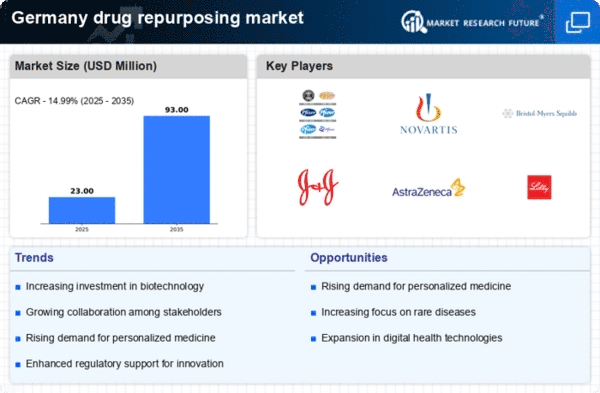Aging Population
Germany's demographic shift towards an aging population is significantly impacting the drug repurposing market. With an increasing number of elderly individuals, there is a growing prevalence of age-related diseases such as Alzheimer's and cardiovascular conditions. This demographic trend necessitates the development of effective treatments, and repurposing existing drugs may provide timely solutions. In 2025, it is estimated that over 22% of the German population will be aged 65 and older, creating a substantial market for therapies targeting chronic conditions. The drug repurposing market is well-positioned to meet this demand. It can quickly adapt existing medications for new therapeutic uses, improving patient outcomes and enhancing the quality of life for the elderly.
Rising Healthcare Costs
The escalating costs associated with healthcare in Germany are driving interest in the drug repurposing market. As traditional drug development can be prohibitively expensive, repurposing existing drugs offers a cost-effective alternative. This approach not only reduces the financial burden on healthcare systems but also accelerates the availability of treatments. In 2025, healthcare expenditure in Germany is projected to reach approximately €500 billion, highlighting the urgent need for innovative solutions. The drug repurposing market presents a viable pathway to address this challenge, as it leverages existing compounds, thereby minimizing research and development costs. Furthermore, the potential for quicker regulatory approval processes enhances the attractiveness of repurposed drugs, making them a strategic focus for healthcare providers and pharmaceutical companies alike.
Advancements in Technology
Technological advancements are playing a pivotal role in shaping the drug repurposing market. Innovations in data analytics, artificial intelligence, and machine learning are enabling researchers to identify new therapeutic uses for existing drugs more efficiently. In Germany, the integration of these technologies into pharmaceutical research is expected to enhance the speed and accuracy of drug repurposing efforts. By 2025, it is anticipated that the use of AI in drug discovery could reduce the time required for identifying potential repurposing candidates by up to 30%. This technological evolution not only streamlines the research process but also increases the likelihood of successful outcomes, thereby attracting investment into the drug repurposing market.
Regulatory Incentives for Innovation
Regulatory frameworks in Germany are increasingly supportive of innovative approaches in the drug repurposing market. Authorities are recognizing the need for expedited pathways for repurposed drugs, which can lead to faster patient access to essential therapies. Initiatives aimed at reducing bureaucratic hurdles and providing financial incentives for research are becoming more prevalent. In 2025, it is expected that regulatory bodies will implement new guidelines that facilitate the approval process for repurposed drugs, potentially decreasing time to market by 20%. This supportive environment is likely to encourage pharmaceutical companies to invest in the drug repurposing market, fostering innovation and ultimately benefiting patients.
Increased Focus on Personalized Medicine
The shift towards personalized medicine is influencing the drug repurposing market in Germany. As healthcare providers increasingly recognize the importance of tailoring treatments to individual patient profiles, repurposed drugs can be adapted to meet specific therapeutic needs. This trend is particularly relevant in oncology and rare diseases, where existing medications may be effective for new patient populations. In 2025, the personalized medicine market in Germany is projected to grow by 15%, underscoring the potential for repurposed drugs to play a crucial role in this evolving landscape. The drug repurposing market is thus likely to benefit from this focus, as it aligns with the broader goal of enhancing treatment efficacy and patient satisfaction.

















Leave a Comment